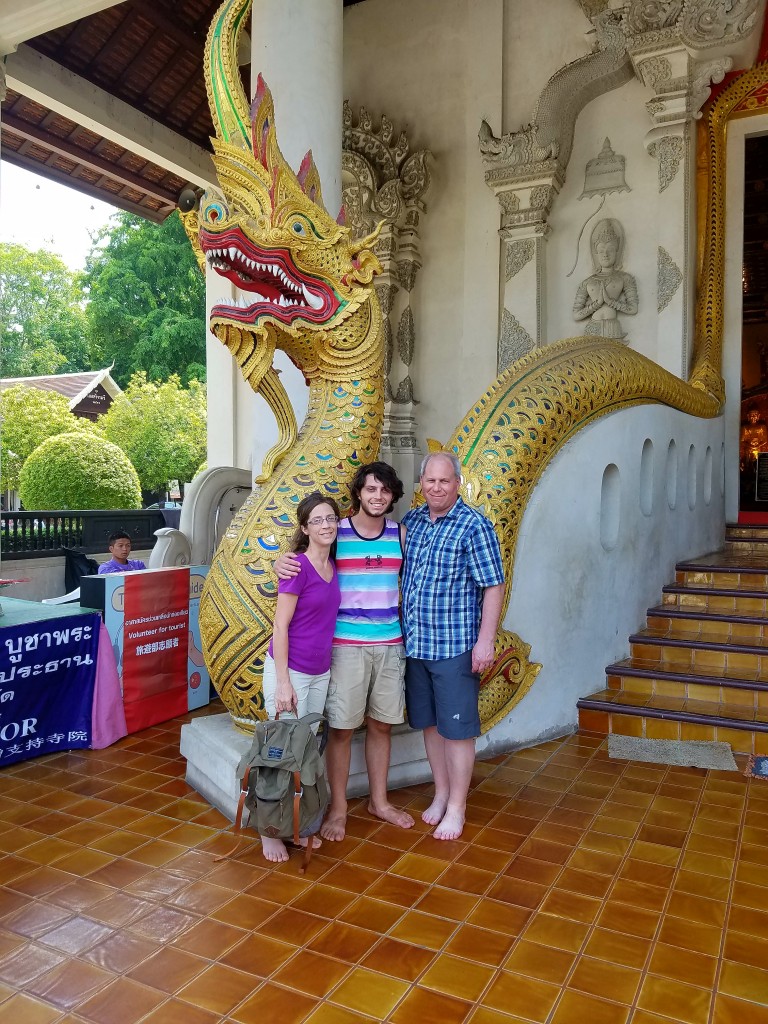If everyone loves the ‘one’ that they have

It’s the next installment in the “Humans of Chiang Mai” series. Ah, that week in Thailand that clean rocked our foundations, turned worlds up-side down.
In the blistering Chiang Mai heat, we mount up. Our team crams into a little songthaew, two of our number hanging on the back, and we join the flow.
The traffic is crazy. Whooshing and honking, trucks, vans and scooters rush past. There are few stop signs or traffic lights, and the rules of the road seem–nonexistent. The wind that whips my hair around is fiery; is fierce, and always and ever, the heat.
Pulling in, we dismount. And look around. Before us, a beautiful temple. In a country that’s 94% Buddhist, this is the norm. But to the white American tourists, it’s all new.
In keeping with their custom, we shed our shoes. The sign just there lists the do’s and the don’ts. Seems every religion’s got its own. They’re all just a little bit different.
FacebookTwitterGoogle+DiggPinterestBlogger
Up and up the stairs we go, then bare feet step into shade. Into stillness, and the marble floor beneath my feet is cold.
There’s a hush.
All around us, beauty. Pillars with gold overlay. A towering expanse, and ahead a huge, golden idol. There are many.
FacebookTwitterGoogle+DiggPinterestBlogger
Before the platform, people are bowing. Hands folded in worship, lips moving in prayer. I can hardly stop looking at the statue, and those people.
FacebookTwitterGoogle+DiggPinterestBlogger
“All these people,” I think in the hush and the still of this place, “praying to one who can’t answer. Who can’t help.” And here in this Buddhist temple, I feel and know His presence, Living Lord.
FacebookTwitterGoogle+DiggPinterestBlogger
Then it’s time. To the right of the temple, they wait. Buddhist monks in their bright orange and brown robes are welcoming tourists. “Monk Chat,” they call it. It’s purposes are two, really. One, it allows the monks to practice their English. Many of them are studying it. Two, it allows visitors to ask them questions about their religion. And so we sit, and we chat. With a monk.
“Our” monk is 26. “Jordan’s age,” I think to myself, thoughts flashing to our oldest son.
I’m impressed with his fluency. He’s quiet, serene, and we begin asking him questions, this and that. Questions about himself, about his family. Questions about his beliefs.
He tells us that he plans to be a monk all his life unlike some of the others. He’s an only child who was orphaned at the age of two. Raised, then, by his grandmother, he watched the monks. Watched them closely, and decided that he wanted to be one, too. And so he did what his religion demands; he forsook his last bit of family, and he left. Gave her up.
He doesn’t plan to see her again. He’s turned his back.
I’m listening with more than my ears. It’s my heart, and this young man is walking right in. My son’s age.
He’s very intelligent. Seeing a chance to strengthen his English, he pulls out a notebook and asks us to explain the difference, the slight nuances between certain English words. We do our best. He’s grateful, and he makes careful notes in his book.
He tells us that he meditates five hours a day. Every week, he fasts for three days. In a row! I see how hard he is working. Always working.
“When you are worried or afraid or upset, what do you do? Do you pray?” I ask him.
“I never ask for anything.” His eyes are unchanging, though every once in awhile, there’s a flicker.
“What do you do, then, when you’re meditating?” Another racer mom pipes up.
“I repeat the chants.” Again, no emotion.
“Do you understand the words you’re saying?” she says.
“No. I don’t want to understand them.” He’s working very hard to get them just right. He wants that more than the meaning. Always working. Get it right.
Finally, I ask him this foundational thing, “What happens to you when you die? What does your religion teach?”
“We just–disappear.”
My God. My Lord. What a hopeless existence; gray landscape. No wonder he looks for nirvana. Living, then dying. Then nothing.
“I’m waiting for death.”
My heart’s just broken. Shattered into a thousand pieces in that hot noonday sun by a temple. For an idol. A god who can’t hear, can’t save.
It’s one of the racers, beloved girl, who lays it out. She delivers the gospel in a nutshell. He’s studied Christianity “a little bit,” he says. This is our chance to bring water. That, living.
He watches. Eyes flat. So’s his affect. We feel the battle. Jesus wants him!
And then, it’s time to go. Our racer speaks up. “Do you mind if we pray for you?” He gives assent, and so before we turn and walk away, we, parents and racers, bow our heads, hearts to heaven, and we carry “our” monk to Lord Christ.
Heading for our ride back to Emmi’s, my son says it. “Mom, it’s overwhelming. And he’s just one! Just one. So many others.”
And so I say to my son what I know: “But he’s the one that God gave us for now. He’s our ‘one.’
“If everyone loves the ‘one’ that they have in this moment, then God’s work is bound to get done. That’s all that we have to do, love our ‘one.’”
FacebookTwitterGoogle+DiggPinterestBlogger
Meet, now, “our” monk, a precious human in Chiang Mai, one who is God’s heart’s desire. His name’s Charat.
My friend, Carolyn, and I are praying that Jesus will appear to Charat as he meditates. I believe that this is exactly what He’d like to do. Who knows but what one day, this beloved monk the age of my son will preach to his own countrymen about Jesus the Christ. Who appeared in a vision. Who was introduced to him by some Americans. Jesus, the One Who’s pursuing.
